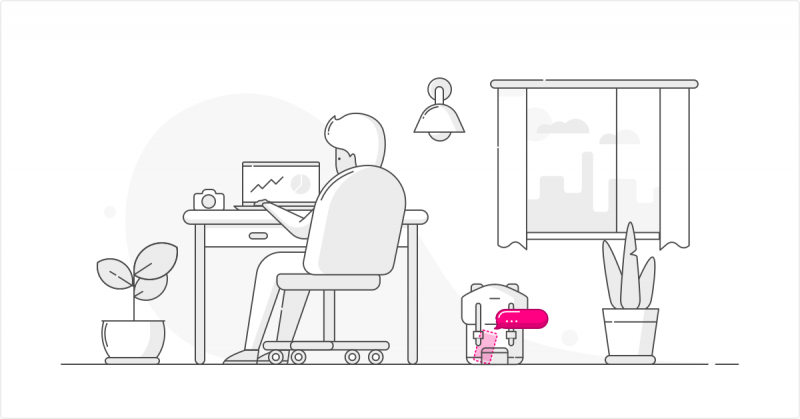Think back to your last 24 hours. How many times did you feel stressed? Once? Twice? Nearly every hour?
Nowadays, it’s almost harder to avoid stress than to endure it. Nearly 4 in every 5 Americans experience the physical symptoms of stress daily. (Gallup)
With the modern day hustle, constant access to email and Slack, and the influences of social media, it’s really no surprise many of us feel this way.
But not all of us have the time (or $$) to take a yoga class, do a soulful spinning class, or get a relaxing massage each day. If we did, we probably wouldn’t be so stressed in the first place!
Our hectic lifestyles call for instant stress hacks – things you can do at your desk or on-the-go in less than 2 minutes, and then get on with your day.
So go ahead and try these 13 instant destress hacks. For best results, do ‘em with a friend, coworker, or partner – not only will it help reduce their stress, but will make your everyday environment that much more chill.
1. Count your breaths
The trick:
Take 2 minutes to count your breaths, tapping on a keyboard key each time you breathe out.
Why it works:
Yogis and medical researchers alike swear on breathing, for good reason. It helps you relax by mimicking how your body actually feels when you’re relaxed.
While proponents usually advise to ‘concentrate on your breath,’ that’s admittedly difficult with so many distractions around us. Instead, counting your breath brings awareness to your breathing, and compels you to breathe deeply for at least 2 minutes. While you may be bored doing this at first, you’ll find that with a bit of practice, counting your breath will bring big returns.
2. Give a hug
The trick:
Grab a friend, and squeeze ‘em tight.
Why it works:
Hugging activates the release of your “cuddle hormone” (aka, oxytocin), which elevates happiness and reduces stress.
In fact, a recent study at Carnegie Mellon found that hugging protects you from the stress-induced susceptibility to infection.
Bonus: Hugging not only reduces your stress, but will also reduce the stress of those around you. So if you and your BFF are both stressed about work, a simple hug will calm both of you down.
3. Create a constant reminder to chill
The trick:
Change your phone background to an image that’ll help you destress.
Why it works:
Let’s face it: most of us are constantly looking at our phones. While this probably increases our day-to-day stress, we can also use phones as tools to destress.
How? Change your phone background to a photo of greenery, seascape, or simply the color blue – all are scientifically proven to reduce stress.
And to avoid the stress of your phone, try to keep it out of sight as much as you can – so it stays out of mind.

4. Unleash the power of lavender
The trick:
Smell lavender when you’re feeling stressed – whether in the form of essential oil, hand cream, or even dried lavender.
Why it works:
When it comes to stress, lavender is something of a godsend. Believe it or not, science shows simply smelling lavender slows your heart rate and lowers anxiety.
That’s because lavender increases your GABA levels, which are neurotransmitters that make you feel relaxed (btw, it also helps you fall asleep).
So whether you prefer lavender oil, cream, candles, or dried lavender, stash some in your bag or put it on your desk, and whip it out when you’re feeling stressed. It’ll bring instant results.
5. Snack smart
The trick:
Nosh on avocados, nuts, bananas, eggs, and/or brussels sprouts.
Why it works:
Turns out, your tummy is a major mediator of the stress response. The connection between the gut and brain is huge – it’s called the brain-gut axis.
So stress eating doesn’t have to be bad, as long as you do it right!
Research shows that omega-3s (like nuts, avocados, eggs, brussels sprouts etc) reduce inflammation, leading to less stress, while potassium (like bananas) helps regulate blood pressure, which rises during times of stress.
6. Talk to yourself
The trick:
Work through your stress in your mind, referring to yourself in the third person. (Ex. “Mel, you’re going to make your deadline – you have five whole hours to finish your report.”)
Why it works:
This may seem awkward, but bare with us here. Studies conducted at Michigan State University found that when people refer to themselves in the 3rd person, their brains reduce their stress within one second.
Talk about instant.
Why? You feel the way you think – that’s where “fake it ‘till you make it” comes from. When you talk to yourself like you would talk to a good friend, you put distance between yourself and your emotions, giving yourself more of a third-party, birds eye view perspective of your stress.

7. Turn on some tunes
The trick:
Listen to classical music, or any music you want, really.
Why it works:
You’ve probably heard that listening to classical music helps reduce stress. It slows your heart rate, lowers your blood pressure, and even decreases your stress hormones. Thanks, Chopin!
But if you’re not a Bach or Beethoven fan, no fret – you can still use music to calm yourself. Studies show that listening to any type of music you love – from Coldplay to Cardi B – will flood your brain with “feel good” neurotransmitters, aka dopamine, which reduces stress.
8. Watch a satisfying video
The trick:
Tune into one of your favorite Oddly Satisfying Instagram accounts – and immerse yourself in ASMR.
Why it works:
We get pleasure from Oddly Satisfying videos as if we were actually performing these oddly satisfying activities – like cutting soap or crunching slime – ourselves. This serves as a form of microtherapy that satisfies and relaxes our brain and body.
These videos are basically a shortcut to a blissed-out, meditative state.
https://www.instagram.com/p/BsYW-N4geSC/
9. Practice gratitude
The trick:
Write down 3 things you’re thankful for, both at the beginning and end of your day.
Why it works:
Gratitude isn’t just a fad – it makes you happier, and also reduces stress. Win win.
Gratitude calms the emotional center of your brain that regulates your mood (aka, the limbic system), and also activates the region of your brain that manages metabolism, sleep, and body temperature (the hypothalamus).
Gratitude also helps you notice the positives in your life and maintain an optimistic attitude, which stabilizes your cortisol levels and reduces stress!

10. Light a candle
The trick:
Boost your environment by lighting a scented candle, and focus on the flame and candle’s scent.
Why it works:
Candles are scientifically proven to soothe us because of the flame – the soft illumination relaxes our minds, increases self-awareness, and reduces stress.
The most relaxing candles are those with scents, since fragrances are gateways to our memories, experiences, and emotions. So when choosing your candle, try to grab a jasmine, lavender, vanilla, or pine variation. They’ll make you feel like you just walked out of a massage.
11. Chew gum
The trick:
Take a pack of gum with you wherever you go, and chew a piece when you need to destress.
Why it works:
Gum is on the top of the list when it comes to easy, quick stress relievers. That’s because chewing gum promotes blood flow to your brain, and causes brain waves similar to those of relaxed people.
In fact, a study showed that people who chew gum have a greater sense of wellbeing and lower stress. We’re lookin’ at you, Sweet Mint.
12. Try the Naam Yoga Hand Trick
The trick:
Apply pressure to the space between your second and third knuckle (aka, the joints at the base of your pointer and middle fingers).
Why it works:
Not just for yogis, this simple hand trick reduces stress in seconds.
Applying this pressure activates a nerve that loosens the area around the heart, which creates a sense of instant calm. Just like breathing, it takes very little time, is free, and you can do it wherever you are, whenever you want!
13. Focus on the upside of stress
The trick:
Reframe your stress as positive, and channel your stress into energy that boosts your performance.
Why it works:
In her book The Upside of Stress, Kelly McGonigal provides science-backed evidence that stress is only actually harmful if you believe it is. If you see stress as positive, you can use it as a force for good.
Consider this: A Harvard study found that students who told themselves that they were “excited” before a presentation were much more persuasive than students who were “calm.”
So no matter where you are, or who you’re with, do this: The next time you’re stressed out, change your negative self-talk into something that’s not relaxing, but encouraging – and use that energy to make things happen.